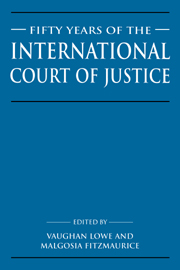Book contents
- Frontmatter
- Contents
- List of contributors
- Preface
- List of abbreviations
- Sir Robert Yewdall Jennings, by Vaughan Lowe
- List of publications of Sir Robert Jennings
- Table of cases
- Part I The International Court of Justice
- 1 The International Court as a world court
- 2 The International Court and the voice of justice
- 3 The London Committee and the statute of the International Court of Justice
- Part II The sources and evidences of international law
- Part III Substance of international law
- Part IV Procedural aspects of the work of the International Court of Justice
- Part V The International Court of Justice and the United Nations
- Index
2 - The International Court and the voice of justice
Published online by Cambridge University Press: 02 November 2009
- Frontmatter
- Contents
- List of contributors
- Preface
- List of abbreviations
- Sir Robert Yewdall Jennings, by Vaughan Lowe
- List of publications of Sir Robert Jennings
- Table of cases
- Part I The International Court of Justice
- 1 The International Court as a world court
- 2 The International Court and the voice of justice
- 3 The London Committee and the statute of the International Court of Justice
- Part II The sources and evidences of international law
- Part III Substance of international law
- Part IV Procedural aspects of the work of the International Court of Justice
- Part V The International Court of Justice and the United Nations
- Index
Summary
COURTS AND JUSTICE
A court of law is theatre, temple and battlefield. A court enacts social process as drama, sacrament and contest. Day after day in the court-room the magic of human self-socializing is performed publicly, for all to see: the universal made particular, the particular made universal. Day after day in the court-room the triunity of social self-constituting is incarnated in unity: the ideal made real in the legal.
Like any other social institution, a court is a transformatory structure-system, transforming social reality in particular ways. Itself the product of the past social reality of a particular society, a court makes a specific contribution to the general social task of forming a given society's future out of that society's past, as it acts in society's continuous present.
A court of law shares with other social institutions also the characteristic that its work of social transformation takes place within a specific form of social reality. A social institution is not merely a systematic structure of action, organizing human work in certain ways; a social institution is a systematic structure within consciousness, organizing the conceiving and perceiving of social reality in characteristic ways.
Since Wittgenstein, it has been convenient to picture these special social realities using the metaphor of the game.
- Type
- Chapter
- Information
- Fifty Years of the International Court of JusticeEssays in Honour of Sir Robert Jennings, pp. 17 - 39Publisher: Cambridge University PressPrint publication year: 1996
- 16
- Cited by



